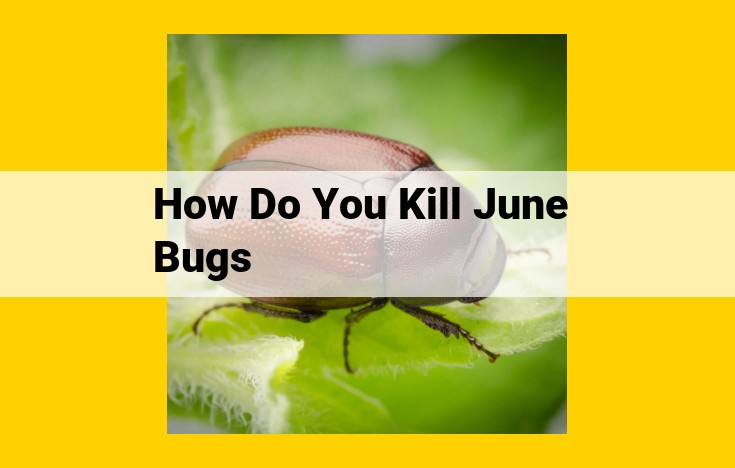How to Kill June Bugs: June bugs can be eliminated using effective insecticides targeting their hiding spots. Physical traps and barriers can also deter them. For eco-friendly options, essential oils like cedarwood and peppermint act as repellents.
Unveiling the Arsenal of Insect Pest Management: Methods to Keep Your Home Pest-Free
When it comes to keeping our homes pest-free, arming ourselves with the right knowledge and tools is paramount. Let’s delve into the diverse array of management methods available to combat these uninvited guests.
Insecticides: A Powerful Chemical Strike Force
Insecticides pack a potent punch against insects, targeting their vital functions. Their effectiveness varies widely, so choosing the right one for the job is crucial. Some insecticides work on contact, while others act as stomach poisons, ingested by the pests. Always prioritize safety when using insecticides, carefully adhering to application instructions and wearing protective gear.
Physical Barriers: Outsmarting Intruders
Harnessing the power of physics, traps, barriers, and vacuums offer a non-chemical approach to pest control. Traps lure pests with irresistible baits, while barriers prevent entry and vacuums suck them up without harm. These methods are particularly effective against crawling insects, such as ants and cockroaches.
Natural Remedies: Harnessing Botanical Power
Inspired by nature’s wisdom, essential oils, botanical extracts, and biological control agents offer eco-friendly alternatives to chemical insecticides. Essential oils, such as peppermint and tea tree oil, repel insects with their strong scents. Botanical extracts, derived from plants like neem and chrysanthemum, have insecticidal properties. Biological control agents, such as ladybugs and predatory wasps, feed on pests, naturally keeping their populations in check.
Essential Elements of Effective Insect Pest Management
Identifying the hot spots where these unwelcome guests tend to congregate is crucial. Kitchens, with their abundant food sources and moisture, often become a haven for ants, cockroaches, and pantry pests. Bathrooms, with their warmth and humidity, attract moisture-loving insects like silverfish and springtails. Gardens offer a buffet of options for aphids, caterpillars, and other plant-damaging critters.
Prevention is always better than cure. Sealing entry points with caulk or weatherstripping denies pests access to your indoor spaces. Maintaining cleanliness by regularly cleaning and disinfecting surfaces, emptying garbage, and removing food crumbs eliminates potential breeding grounds. Reducing moisture through proper ventilation and addressing leaks helps deter moisture-dependent pests.
To effectively combat insect infestations, you’ll need the right tools for the job. Applicators ensure precise insecticide application, minimizing waste and environmental impact. Protective gear, including masks, gloves, and long sleeves, safeguards you from harmful chemicals. Monitoring devices, such as sticky traps or pheromone lures, help detect infestations early on, allowing for prompt action.
Additional Considerations in Insect Pest Management
Integrated Pest Management (IPM): A Sustainable Approach
Effective pest management goes beyond isolated solutions. Integrated Pest Management (IPM) brings together a comprehensive arsenal of methods to sustainably mitigate insect infestations. By combining physical, chemical, and biological strategies, IPM aims to minimize pest populations while preserving the health of the environment and human occupants.
Responsible Insecticide Use: A Balancing Act
Insecticides can be powerful tools, but their use requires utmost caution. Proper storage, dilution, and application are paramount to safeguard human health and the ecosystem. Follow label instructions meticulously and wear protective gear to minimize exposure. Consider less-toxic alternatives, such as botanical extracts or essential oils, when appropriate.
Environmental and Health Implications: A Careful Consideration
Pest management should always consider its potential impact on the environment and human health. Opt for eco-friendly products and practices that minimize harm to non-target organisms and reduce chemical residues. Educate yourself about the latest research and best practices to ensure responsible pest control.
Remember, pest management is an ongoing process that requires vigilance and adaptability. By embracing a comprehensive and responsible approach, we can effectively mitigate insect infestations while safeguarding our health and the environment.
